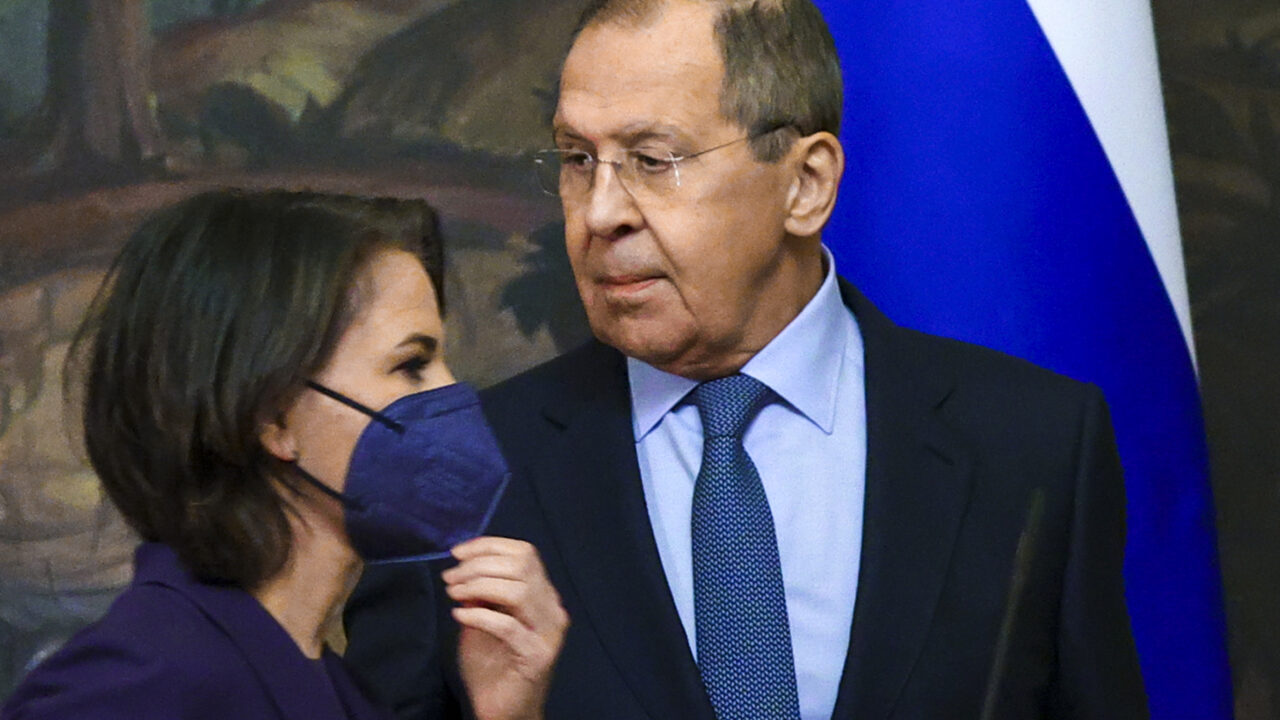Sanctions in the pipeline: Germany’s troubles over Russia and Nord Stream 2
The German government has finally dispelled the uncertainty around its stance on Nord Stream 2 and potential sanctions on Russia. But the major tests of Berlin’s ability to act may still lie ahead
Following weeks of speculation about whether Nord Stream 2 could feature as part of a sanctions package if Russia attacks Ukraine, Germany’s new chancellor, Olaf Scholz, has finally provided some clarity. When asked yesterday following a meeting with NATO secretary general Jens Stoltenberg, Scholz said he and his government stood by all aspects of the German-American pipeline deal signed by the previous Merkel government in July 2021 – a deal that includes provisions to introduce sanctions if Russia were to “use energy as a weapon or commit further aggressive acts against Ukraine”. In the event of a military intervention against Ukraine, “everything will be up for discussion”, he confirmed. After days if not weeks and months of uncertainty and mixed signals, he put the messaging around Germany’s Russia policy back on track.
In the “traffic-light” coalition of Social Democrats (SPD), Greens, and Free Democrats, dealings with Russia are controversial. During the negotiations on the foreign policy chapter of the coalition agreement, this was the most difficult issue. The main dividing line is between the Greens and the Free Democrats on the one hand, both of which favour a tougher German policy on Russia, and the SPD on the other, which strongly emphasises the need for continued “détente” and “dialogue” in the relationship and does not want to break hard with the policies of the former grand coalition, of which the SPD was a member.
Since the new coalition government entered office in December, confusion has reigned about who is now setting the direction of its policy on Russia – the SPD-led Chancellery or the Green-led Foreign Office? This naturally includes the role and importance of the Nord Stream 2 pipeline, which still awaits approval to operate from German and EU regulators.
In December, Scholz downplayed Nord Stream 2 as a mere “private-sector project”, taking pains to distinguish the pipeline’s operation from any wider efforts to prevent a violation of Ukrainian borders, describing them as “separate issues”. This argument was recently reiterated by Scholz’s fellow Social Democrat, defence minister Christine Lambrecht, and the party’s influential secretary general, Kevin Kühnert. In contrast, German foreign minister Annalena Baerbock and several other leading Greens (and Free Democrats) have emphasised the geopolitical aspects of the project and articulated their related “security policy concerns”.
Scholz’s new statement should bring more coherence to the German debate and reassure partners abroad who had started to see Germany as the West’s weak link.
The result was a cacophony of different voices that gave the impression that Berlin was either lacking in leadership, or that – as much as many Europeans bemoan their own marginalisation – the government was happy enough to let the Biden administration take the lead. It was perhaps a mixture of both, none of which presented a picture of clear German leadership.
Scholz’s new statement should hopefully now bring more coherence to the German debate and reassure partners abroad who had started to see Germany as the West’s weak link. Thursday’s visit to Berlin by US secretary of state Antony Blinken is a good chance to signal transatlantic unity on the issue of using the Nord Stream 2 pipeline as “leverage” in relation to Russia’s actions. This should also strengthen Joe Biden’s position vis-à-vis the Senate, where his administration is trying to prevent the Democrats from imposing bipartisan sanctions on German companies involved in the project. Reassurance from Berlin that sanctions are on the table will assist the president in this.
The real challenge for the German government, however, will only come if Russia escalates the situation further and the question of stopping the pipeline becomes no longer simply rhetorical. Berlin is surely hoping that it will not come to that. Germany needs Russian gas as a bridging technology because of its decision to phase out coal and nuclear power. Rising energy prices are already a heavy burden on consumers. And, according to a recent survey, 60 per cent of the German population support the pipeline. If the Kremlin actually used energy as a weapon by, for example, blocking gas deliveries through Ukraine while offering to activate Nord Stream 2 instead, the domestic debate in Germany could quickly become very difficult.
It would then take significant political capital and leadership for Scholz to make the argument for including Nord Stream 2 in a sanctions package, and especially to get his fellow Social Democrats on board. However, if the chancellor is serious about what he said in his first government statement to the German Bundestag, when he emphasised that “any violation of [Ukrainian] territorial integrity will come with a high price”, putting Nord Stream 2 into the mix will be inevitable.
It may well be that the pipeline is overrated as a means of exerting pressure on Russia, but it had become for critics a symbol of everything bad about Germany’s Russia policy, and the lingering uncertainty only made this worse. How the new German government now manages this crisis with Moscow is the first major test of its ability to act in foreign policy. There are many indications that the crisis could yet escalate further. Domestic debate about the political dimension of the Nord Stream 2 pipeline is probably only beginning. Pressure on Germany to contribute militarily to deterring further Russian aggression could increase very quickly. This could involve German arms deliveries to Ukraine, or sending greater support to the allies of NATO’s eastern flank. When that time comes, Berlin should seek to avoid the weeks of confusion it allowed to play out over Nord Stream 2 and sanctions.
The European Council on Foreign Relations does not take collective positions. ECFR publications only represent the views of their individual authors.



